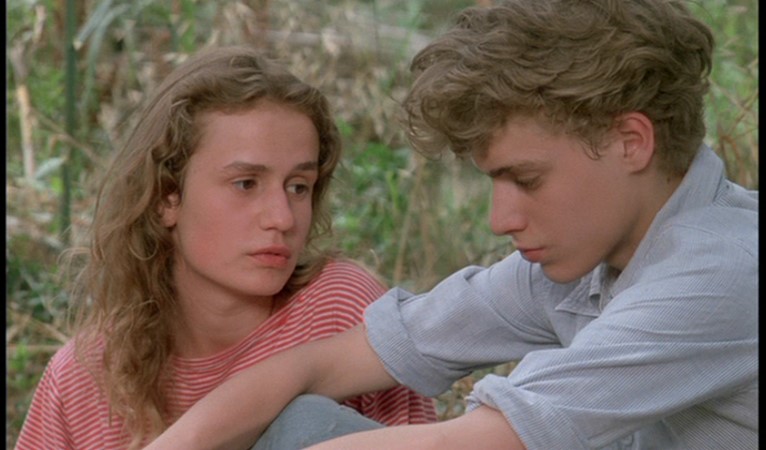|
Genres, Themes, Actors, and Directors:
- Coming-of-Age
- Family Problems
- French Films
- Sexuality
Response to Peary’s Review:
As Peary and others have noted, this French coming-of-age story — a “disturbing portrait of 16-year-old girl (Sandrine Bonnaire) who drifts into a series of meaningless, unfufilling sexual affairs” — is raw, disturbing, and oddly compelling. Bonnaire (who, in her debut, “looks a bit like the young Diane Lane”) is entirely convincing in the lead role, playing a nubile teen who uses her burgeoning sexuality as a means of rebellion and escape from her dysfunctional family, rather than for intimacy and love. Just as the two young children in Rene Clement’s Forbidden Games (1951) cope with the war and death surrounding them through intricate burial rituals for animals, Bonnaire deals with her chaotic family life by escaping into meaningless affairs; as Peary argues, she does this not just “to hurt her parents for being uncaring, but also because that’s her only choice”. He concludes his review by noting that “long after seeing the film you [will] still think about [Bonnaire] and those like her who are forced to bring themselves up, long before they have the maturity to know what’s good for them.”
Redeeming Qualities and Moments:
- Sandrine Bonnaire as Suzanne

- A realistic, if depressing, portrayal of a dysfunctional family

Must See?
Yes, for Bonnaire’s affecting performance.
Categories
Links:
|
One thought on “A Nos Amours (1983)”
First viewing. A once-must, if only for (what essentially is) Bonnaire’s major debut role. Bonnaire is one of those very natural actresses who the camera seems to love (of course, it doesn’t hurt that she’s stunning) and whose impact appears effortless.
This film, at least in overall tone and structure, reminds me of the 1973 PBS documentary series ‘An American Family’ – which followed the dysfunctional ‘adventures’ of the Loud family. That series single-handedly erased American tv viewers’ perception of ‘the perfect family’ – as glorified in shows from ‘Father Knows Best’ to ‘The Waltons’. (I wonder if ‘An American Family’ was shown on French tv and/or if director Pialat was at all inspired by it.)
Although there appears to have been an actual script, each scene seems freely and effectively improvised. (Thus, something like Cassavetes’ ‘A Woman Under the Influence’ comes to mind.)
For a film detailing, in part, a young woman’s sexual awakening, there is very little sex: we see someone in postcoital exhaustion; people dressing after; an extended pick-up scene but not what it leads to, etc. Pialat could easily have exploited what he depicts but he’s surprisingly reserved in sexual matters (though not at all in the eruptions of temper).
The film can be a little hard to follow in terms of the progression of Bonnaire’s love life: one somewhat-serious relationship seems to end inexplicably; another potentially meaningful one seems to just suddenly appear, then just as suddenly vanish. No doubt that’s intentional, since Bonnaire’s Suzanne – as stated – uses sex “as a means of rebellion and escape…”.
Perhaps the film’s most compelling sequence arrives near the end when, as Dad, Pialat makes an unexpected return appearance.
I’m not sure the average ff could (or would want to) sit through this more than once. It comes off to me as pretty much ‘what you see is what you get’ and its forcefulness is enough to leave a lasting impression.
Side note: Cyril Collard plays one of Bonnaire’s amours late in the movie. Collard would eventually go on to write (adapting his novel)/direct/star in the controversial ‘Savage Nights’ (‘Les nuits fauves’, 1992) – a very powerful film which I’ve always been ambivalent about, given its focus on Collard as a self-serving, irresponsible libertine.